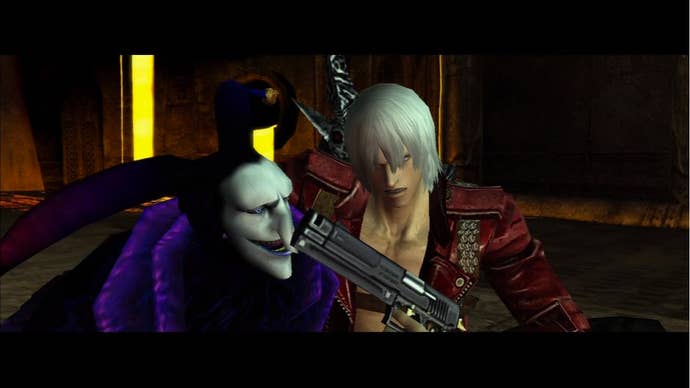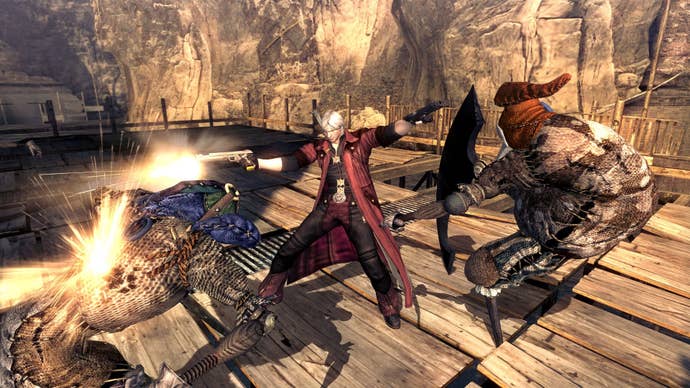The Devil's Own: Capcom's Hideaki Itsuno on a Decade-Plus with Dante
The guiding hand behind Devil May Cry talks about his ups, downs, and everything-in-betweens with Capcom's groundbreaking action series.
This article first appeared on USgamer, a partner publication of VG247. Some content, such as this article, has been migrated to VG247 for posterity after USgamer's closure - but it has not been edited or further vetted by the VG247 team.
It took us a while to get there, but in 2001, Capcom created the first true 3D action game with Devil May Cry. (Or, at the very least, the first action game that felt right in a 3D space.)
In the 14 years since the series' debut, creator Hideki Kamiya has moved on to his own studio, and Devil May Cry's spiritual successor, Bayonetta, but Capcom hasn't let his legacy wither on the vine. After Devil May Cry's debut, Capcom's Hideaki Itsuno took over, directing parts 2, 3, and 4, as well as overseeing 2013's fantastic reboot, DmC.
Though Itsuno might be known best for his work on this series, he's had a variety of projects in his 20 years at Capcom, from Power Stone to Auto Modellista to Dragon's Dogma. And at this year's E3, Itsuno offered his thoughts on his history with Devil May Cry just in time for the release of part 4's Special Edition, which he originally directed in 2008.
USgamer: Can you tell me how, from a design perspective, the Devil May Cry Series has evolved since its origins?
Hideaki Itsuno: So the Devil May Cry Series started as off as a sort of Resident Evil spin-off in development, which became its own thing... [A]t first it had a lot of the same elements as Resident Evil, such as puzzle solving, but actually, as the series has progressed, it’s become a lot more cinematic and the puzzle solving has become less important, and it’s become the action-focused game that you know and love today.
USg: How did you come to work on the series? What were your initial thoughts on accepting the project?
HI: So, the Devil May Cry 2 project actually wasn’t going terribly well at one point in development, and they needed someone to come in and help them get it on track again. My boss was saying, “Who should we have deal with it?” And he just kind of said, “Itsuno, you do it.” At first I was like, “Seriously?” But I took the mission on with the mind to doing the best I could.
USg: Looking at the series as a whole, Devil May Cry 2 probably garnered the most negative reaction. Did that reaction factor into the development of Devil May Cry 3 at all?
HI: I came on board with 2 about halfway through the project, and as I was saying, maybe it didn’t quite turn out the way wanted it to and there was a certain reaction to that from the community. I think with 3, rather than taking directly on board feedback related to 2 and say, acting on that particularly, I just kind of wanted to start over in 3 and make the action game that I wanted to make. So, in a sense, 1 and 2 were done, and 3 was a bit of a fresh start for the series.

MW: Most writers and creators generally don’t like revisiting their old work. Does the Special Edition of Devil May Cry give you a chance to improve on anything that you feel the original game lacked?
HI: I don’t really mind revisiting my old works as much, and with this project, we wanted to bring this game up to date. It’s been seven years since Devil May Cry 4 came out, so there is a bit of a gap. I think certain expectations on the player’s side have changed. We wanted to make it playable by modern gamers without feeling any frustration. Once we had sorted that out, we didn’t want to redo any of the mechanics of the game or anything like that. We weren’t going to be making it a different game, but we did put a lot of extra content in, in terms of the new playable characters, so that’s the part that I really enjoyed: adding, rather than, say, redoing, the mechanics totally and making a different game.
USg: Across the entire series, is there a boss, or enemy encounter that you feel is your favorite from a design perspective?
HI: That would be Berial from Devil May Cry 4, and obviously, it’s still in Special Edition. It’s a huge-ass boss with a big sword, so it’s a simple concept in a way, and his attacks are, I wouldn’t want to say easy, but straightforward in what he comes at you with—but you really have to strategize as a player to deal with him. It was difficult to actually create the boss because it was so big that, even at the time—7 years ago—to be able to have this boss able to work on screen was quite hard. We were really happy with the outcome of it. It still looks good today in the Special Edition, this huge boss, so yeah, that would be my favorite one.
USg: What was the most challenging Devil May Cry game for you to direct?
HI: Probably Devil May Cry 3. It was a very challenging project, but it was a real turning point, I think, for the series, and for us. If you look at the Devil May Cry games before that one and after it, you can really see that it was the one that brought the cinematics to a new level and the graphics to a new level. I was able to able to bring to bear the know-how that I have developed so far at Capcom. You know, I’ve got a history with fighting games and stuff and being able to really bring the game play from that sort of game and combine it with this 3D action into one seamless whole... [Devil May Cry] 3 was the first time I really felt that came out as such a great package. It was certainly a challenge, but it represents a quantum leap in the series.

USg: Your productions aren't limited to the stylish action of Devil May Cry; your time at Capcom has seen you working across many different genres. Has working on the Devil May Cry series informed your work on different experiences, like Dragon's Dogma?
HI: As I said, my history at Capcom before Devil May Cry was in fighting games... [A] fighting game is one stage on screen; it doesn’t scroll except for a little bit to the left and right, and it’s one setting. With Devil May Cry, I really learned how to make a game that actually is about progressing through larger environments. I always wanted to make an RPG, even though it’s not something that Capcom is known for; so when that project came about, it was a perfect chance for me to combine the skills I had developed previously. The result was essentially Dragon’s Dogma. So it’s definitely had an influence.
USg: Finally, what do you feel that the new generation of consoles has to offer for the stylish action genre games like Devil May Cry?
HI: So, obviously, this is the first time that we’ve had the series come to next generation as a port, but working with the next-gen consoles, I find that, from a technical base, there’s a lot of potential. Like the amount of memory you have to work with, and not just that, but the additional networking capabilities and relatively seamless nature of the next gen consoles is something I feel we can take advantage of.
Bob would like to thank Mike Williams for his assistance in conducting this interview.
